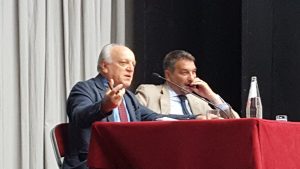The circular economy is paralyzed. The blocking of the activities is costing us 2 billion Euros every year. It is fundamental to immediately adopt the European Regulation that allows the release of the authorisations for recycling.
CONFINDUSTRIA, CIRCULAR ECONOMY NETWORK, CNA, FISEUNICIRCULAR, FISE ASSOAMBIENTE, CONFEDERAZIONE ITALIANA AGRICOLTORI, CONFARTIGIANATO IMPRESE, CONFCOOPERATIVE, LEGACOOP PRODUZIONE E SERVIZI, CISAMBIENTE, FEDERCHIMICA, FEDERACCIAI, FEDERAZIONE GOMMA PLASTICA, ASSOMINERARIA, CONAI, CONOU, ECOPNEUS, CONFEDERAZIONE LIBERE ASSOCIAZIONI ARTIGIANE ITALIANE, GREEN ECONOMY NETWORK DI ASSOLOMBARDA, UTILITALIA, CASARTIGIANI, CONFAPI, ASSOVETRO, CONFAGRICOLTURA, CONSORZIO ITALIANO COMPOSTATORI, ECOTYRE, COBAT, CONSORZIO RICREA, ANCO, AIRA, GREENTIRE, ASSOBIOPLASTICHE, ASCOMAC COGENA, ECODOM, AMIS, COMIECO, ASSOCARTA, FEDERAZIONE CARTA E GRAFICA, CENTRO DI COORDINAMENTO RAEE, SITEB, ASSOREM, FIRI, FEDERBETON, AITEC, CONOE, COREPLA, FEDERESCO, ANGAM, CENTRO DI COORDINAMENTO NAZIONALE PILE E ACCUMULATORI, UCINA – CONFINDUSTRIA NAUTICA, ASSOFOND, CONSORZIO CARPI, ASSOFERMET, AGCI-SERVIZI
gathering today in Rome’s Spazio Eventi Spagna, these companies have provided a stark warning to report the severe repercussions on the environment, on citizens’ health, and on waste management costs for both companies and enterprises following the halt of the circular economy sector.
 The Council of State has, de facto, paralysed all waste recycling activities. The legislative measure of the “Sblocca Cantieri” Decree with reference to End of Waste has not solved the situation. Indeed, it has only safeguarded the recycling typologies and activities provided for – and regulated by – the Ministerial Decree of 5th February 1998 and following. It has, thus, excluded all those activities that were born in the meantime. This regulatory framework effectively prevents several waste recycling activities, both of urban and industrial nature, and the creation of new activities and plants.
The Council of State has, de facto, paralysed all waste recycling activities. The legislative measure of the “Sblocca Cantieri” Decree with reference to End of Waste has not solved the situation. Indeed, it has only safeguarded the recycling typologies and activities provided for – and regulated by – the Ministerial Decree of 5th February 1998 and following. It has, thus, excluded all those activities that were born in the meantime. This regulatory framework effectively prevents several waste recycling activities, both of urban and industrial nature, and the creation of new activities and plants.
As it is known, separate waste collection is a precondition for virtuously managing waste by the means of their correct delivery to plants in charge of their recycling. However, this is not enough. The plants have to be authorised to end the definition of “end of waste”, so that, after their treatment, they are able to become new products, materials, and objects destined to the market.
Sending our waste abroad is too expensive for both citizens and companies. It is precisely a country as poor of raw materials as Italy is that ought to valorise waste materials to be competitive on international markets and, thus, strengthen its entrepreneurial base. The halt of authorisations is costing us more than 2 billion euros every year.
The development of processes and products linked to the circular economy represents a strategic challenge to guarantee a rational use of natural resources; thus, this deadlock has been reported by the companies today and it has already been presented to the Institutions several times. It is a call to general attention. Indeed, with today’s call, the entrepreneurial world is speaking not only to the Institutions, but also to citizens. If the activities of recycling are not rapidly unblocked, the current crisis, that is already hitting urban and special waste management, will worsen. This will lead to critical situations in many cities all over the national territory, with the risk of overloading incinerators and landfills.
The activities that are particularly hit are precisely those that use the most innovative modalities and technologies for waste recovery and recycling. Thus, paradoxically, they are also the most effective companies with reference to environmental protection and the development of a circular economy.
The solution for putting an end to this emergency has been indicated by Europe with the Directives about circular economy, published in June 2018. Both companies and Associations have strongly requested to accept such Directives into the Italian legislation to guarantee a safe and effective waste management, and to face environmental and economic challenges at global level.
Italian companies with their plants want to carry on with their activities of transitioning towards a circular economy, consolidating their leadership at European level in leading the growth process towards decarbonisation and an efficient use of natural resources.

 Collect ELT
Collect ELT